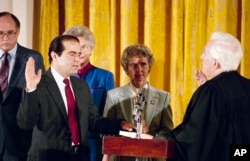The death of U.S. Supreme Court Justice Antonin Scalia set off a legal and political earthquake in Washington and beyond.
The arch-conservative jurist’s passing guarantees a confrontation between the White House and the Republican-led Senate on confirming a successor, and could put ideological control of the high court at stake in this year’s presidential election.
Nominated by President Ronald Reagan in 1986, Justice Antonin Scalia authored some of the Supreme Court's most conservative and impactful opinions on voting rights, immigration, and terror suspects held at Guantanamo Bay, Cuba – to name but a few.
He also authored some of the high court’s most colorful dissents on President Barack Obama’s signature health care law, gay rights, and prayer in public schools.
Although Obama and Scalia rarely saw eye-to-eye on constitutional matters, the president was quick to pay tribute to Scalia and his judicial legacy.
“For almost 30 years, Justice Antonin ‘Nino’ Scalia was a larger-than-life presence on the bench -- a brilliant legal mind with an energetic style, incisive wit, and colorful opinions,” Obama said. “He influenced a generation of judges, lawyers, and students, and profoundly shaped the legal landscape. He will no doubt be remembered as one of the most consequential judges and thinkers to serve on the Supreme Court. Justice Scalia dedicated his life to the cornerstone of our democracy: The rule of law.”
Focus on vacancy
No sooner had condolences and tributes been uttered, the nation’s attention shifted to filling the Supreme Court vacancy.
Federal judicial nominees must be confirmed by the Senate, and Republican Majority Leader Mitch McConnell swiftly issued a statement saying, “The American people should have a voice in the selection of their next Supreme Court Justice. Therefore, this vacancy should not be filled until we have a new president.”
Obama, meanwhile, signaled he will not be deterred.
“I plan to fulfill my constitutional responsibilities to nominate a successor in due time,” the president said.
Senators across the ideological spectrum were quick to weigh in. Republicans, two of whom are vying to be their party’s presidential nominee, say no Supreme Court pick will be confirmed until a new president is sworn in next year.
“We’re not going to move forward until there’s an election. And I think that’s the right decision,” said Senator and presidential hopeful Marco Rubio, speaking on ABC’s “This Week” program.
“The Senate has not confirmed a nominee that was named in the final year, an election year, in 80 years. This is a lame-duck president,” said another presidential contender, Republican Ted Cruz, also on ABC. “This next election needs to be a referendum on the court. The people need to decide.”
Senate Democrats disagree
“The fact is, when you elect a president, you have to assume a Supreme Court vacancy, he is going to make the nomination,” said Senator Patrick Leahy, the top Democrat on the Judiciary Committee, speaking on CNN’s “State of the Union” program. “And it would be a sheer dereliction of duty for the Senate not to have a hearing, not to have a vote.”
“The constitution is pretty clear. It’s the job of the president of the United States to appoint, nominate members of the Supreme Court, and the Senate confirms,” said Independent Senator Bernie Sanders, who is running for president as a Democrat, on ABC. “President Obama in my view should make that nomination. I hope he does it as soon as possible.”
Such arguments triggered a blunt response from Cruz.
“If the Democrats want to replace this nominee, they need to win the election,” the senator said.
Supreme Court justices have lifetime appointments, and Scalia’s successor could move the court’s ideological center of gravity on a multitude of polarizing issues including abortion, gun control, corporate power, and environmental regulation.
If Senate Republicans hold true to their pledge, the November election will not only decide the next occupant of the White House for four years, it will impact the makeup of the Supreme Court for a generation or more.






